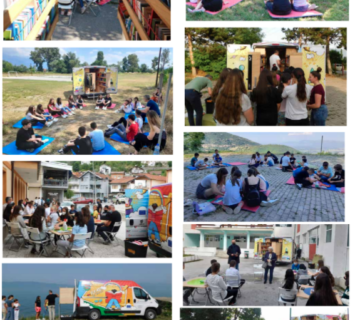This is the third year since the beginning of the project READ – Regional Network for Cultural Diversity – funded by the European Commission and implemented under the leadership of Goethe Institut, Skopje, in collaboration with five partner organizations: Instituti i Librit dhe i Promocionit (Albania), Krokodil (Serbia), Kalem Culture Association (Turkey), LOJA Center for Balkan Cooperation (North Macedonia), and Qendra Multimedia (Kosovo). The project is dedicated to the intercultural dialogue in the Balkans by opening new channels of communication for independent actors in the realm of culture. It is fully in syntony with the commitment of our magazine, and this is why we are dedicating for the third year a special issue to the project READ.
As it can be seen from our previous special issues, namely number 11 and number 12, READ is a multifaceted project. Besides the program of residency, to which we are dedicating again the Dossier, there is the program of subgrants to smaller organizations in the above-mentioned countries, with a big number of participants engaged; and there is also READ on Wheels, with a library-bus travelling throughout Albania and Turkey – with a lot of intensive activities in both the big and the small country. And there are, of course, the literary festivals, which this year were held in the five countries covered by READ. In North Macedonia it was for the first time; in Tirana, although the respective organization has a tradition in literary festivals, it is the third year within READ, which provided a wider scope, and this seems to be well consolidated; in Belgrade, Istanbul, and Prishtina, the respective literary festivals have a longer tradition, since more than a dozen of years, quite naturally the format is evolving. And the five festivals will have new editions even after the project READ.
In our issue dedicated to READ 2022, we mentioned that a war had started in Ukraine, and that a ramification of the conflict was a looming danger for our region. During 2023 this danger has only become more present. Moreover, a new war has started very close to Europe. And within Europe sinister political tendencies are becoming a stronger threat for freedom. What has culture to do in this context? Why culture? Are we like the orchestra of Titanic, like that group of musicians who kept on playing with their instruments while the ship was irremediably sinking?… Indeed, the sinking of Titanic has become an epitomizing metaphor of the times that were supervening, with world wars and tyrannies. Indeed, bad times are announced again, like the tenebrous waters of the bottom of the ocean, with different kinds of possible calamities. However, as the motto of this magazine claims, “better to light a candle than to curse the darkness”.




